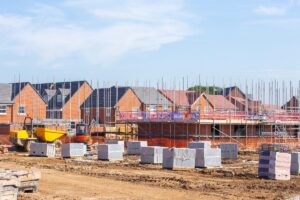Labour’s Bold Housing Policy Could Win Them The Next Election

With a general election scheduled to take place on 4 July, thoughts are turning to the housing policy of the two main parties and what they are offering voters.
At the last election, the Conservatives won a thumping majority with Boris Johnson at the helm, pledging to level up across the country.
The pandemic meant those plans were placed on the backburner for a few years and the reforming zeal promised in the election campaign never returned.
It’s interesting to look back at the promises made in the Conservative manifesto in 2019. They pledged to build a million homes over the course of this parliament, with 300,000 to be built every year.
Research by the BBC makes it clear the government has fallen short of both targets. From April 2020, 686,613 homes have been built, representing 68% of their target. The government also fell short of its goal to build 300,000 new homes every year, with the high watermark being the 248,591 additional homes built from 2019 to 2020.
With this in mind, let’s look at the key tenets of the housing policies of both main parties and what it could mean for voters, especially those looking to buy a home.
New Homes

Labour's policy could see more new homes built
Both parties are committed to building more homes over the term of the next Parliament. Despite backtracking and referring to their housebuilding targets as advisory, the Conservatives still plan to build more houses. The goal is to reach the 300,000-a-year figure and loosen planning laws to help meet this target.
Labour’s plans are similar but they are more ambitious in some areas. Keir Starmer has indicated he would restore mandatory targets to build 300,000 homes a year under a Labour government, with plans to build 1.5 million homes over the next Parliament
Labour also wants to loosen planning laws to boost housebuilding, with a focus on building affordable housing. A new generation of ‘new towns’ is also planned, harking back to the postwar Atlee government, which built new towns such as Stevenage.
There’s also a focus on approving high-density housing on urban Brownfield sites and supporting first-time buyers by giving them priority to buy in new housing developments thanks to a new government-backed mortgage guarantee scheme.
If you’re looking to get on the housing ladder, Labour’s plans look stronger and many young people who are struggling with rent or still living with their parents will be tempted to back the party because of this.
The problem the Conservatives have is that after 14 years in power, and the dissolution of the Help to Buy scheme, do they have anything new to offer voters, especially younger voters?
They’re yet to finalise their plans fully, but unless they can offer a compelling alternative that increases the housing supply, it’s hard to see how they can rely on their previous record to convince voters they’re to be trusted with adding to the nation’s housing stock.
Rental sector
We’re advocates for the free market at Online Mortgage Advisor, so it’s interesting to see both parties’ plans regarding the rental market. This has been an area of contention for years with landlords seeing tax changes and restrictions, while tenants have seen their rent increase, especially in recent years with the cost of living crisis.
A big element of the Conservatives 2019 manifesto was the introduction of a Renter’s Reform Bill. Five years later, this has still not made its way through Parliament and it’s unclear whether it will become law before the election.
The plans included abolishing Section 21’no fault’ evictions, bringing in a new system of rolling tenancies and introducing the Decent Homes Standard used in social housing to the private sector.
Labour plans to introduce a renter’s charter, which includes scrapping no fault evictions on the first day of a new Labour government. The party is also making a similar commitment to the Tories in regards to the Decent Homes Standard, with a pledge to make it legally binding for the private sector.
Although neither party has explicitly outlined plans for rent controls, the Labour Mayor of London Sadiq Khan has suggested introducing them in the capital. Our Managing Director, Pete Mugleston, had this to say about rent controls: “Rent controls are a bad idea, as they incentivise landlords to refrain from investing in their properties. There’s also the issue of landlords being pushed to the point of bankruptcy if borrowing rates and inflation rise while controls are in place.”
Rent controls stabilise rents for tenants but where they have been introduced in other places such as Berlin, where controls have been in place since June 2015, they often exacerbate issues rather than solve them. Rent controls in Berlin have resulted in reduced mobility as tenants are reluctant to leave an area with favourable rent, impacting the number of flats available to rent to newcomers and those forced to move.
With both parties pledging to build more houses, this is the approach we’d like to see. Increasing the supply rather than imposing arbitrary controls is the best solution for landlords and tenants.
Social Housing
The social housing stock has dwindled since the Right to Buy scheme was introduced under the Thatcher government in 1980. From 6.5 council homes in 1979, the stock has now been reduced to 2.2m in 2022, and with 4.4m households now renting, more social housing stock would benefit many.
So what are the plans of the two main parties?
A controversial scheme proposed by the Conservatives is to prioritise ‘British homes for British workers.’ It’s unclear how the policy will work in practice or whether it will be Conservative policy at the election but it hints at the direction the party may look to travel in the upcoming campaign.
Labour hasn’t made any clear policies regarding social housing, but their general plan is to increase the social housing stock and reduce the number of homes sold through the Right to Buy scheme.
More social housing needs to be built, especially due to the depletion of the stock because of Right to Buy. It’s a good policy to encourage people to get onto the property ladder, but if new social housing stock isn’t built to replace those lost through the scheme, it squeezes already stretched local authorities.
With 1.29 million people on the social housing waiting list in March 2023, the best policy either party can present for social housing is to build more homes!
Energy Efficiency

Both parties plan to focus on reducing household bills
Following the Russian invasion of Ukraine which led to increased energy bills for millions, there has been a greater focus on improving the energy efficiency of houses across the country.
This problem is particularly pressing because the UK has some of the oldest housing stock in Europe. One-third of all the homes in the UK were built before 1946 and 75% of homes built before 2010 are inefficient.
This could be costing households thousands of pounds every year, and with an ongoing cost of living crisis, improving the energy efficiency of homes is a potential big win for the party that can implement an effective scheme.
The Conservatives had planned to upgrade all rental properties to an Energy Performance Certificate (EPC) rating of C. However, these plans were scrapped as it was felt that the pressures on landlords were too great already.
Labour aims to upgrade millions of homes across the UK via its Warm Homes Plan. The intention is to increase the energy efficiency of houses and reduce household bills in the process. The party estimates this could cut household bills by up to £1,000 a year.
With rising bills a big political issue heading into the election, expect plans such as these to be front and centre of election campaigns. Britain’s houses need to be improved, with many leaky homes costing taxpayers thousands of pounds and still unprepared for a changing climate.
Improvements such as these are an investment either party should be willing to make that will have a long-term impact on homeowners and future homebuyers.
Rounding Up
Both parties have interesting housing policies ahead of the election. Labour has more proposals outlined, but with the election date still to be confirmed, expect the Conservatives to introduce more policies once the campaign is underway.
One area that both parties should agree on is the need to build more homes. Most of the issues mentioned above, relate to the shortage in housing stock.
First-time buyers trying to get on the property ladder, landlords and families looking for social housing would benefit from more homes being built. New, energy-efficient homes would also be a boon to the housing market and save new buyers thousands in home improvements.
Labour’s policies look more promising at this stage, but that could change as the election nears and the Conservatives flesh out their plans. It’s also yet to be seen whether either party rows back on their plans because of budgetary constraints or shifting priorities.
What is clear though is that housing will play a huge role in the next election and could be one of the main factors that decides whether the Conservatives win a record fifth term in office or Labour returns to power after 14 years in the wilderness.
Check out this article for a broader look at all the parties’ housing policies ahead of the election.
About the author
Tom’s main role at Online Mortgage Advisor is to cover the housing market and write engaging and thoughtful pieces on what this means for the average person. With a background in construction and a keen interest in the world of property, Tom offers insightful thoughts on the world of mortgages and the state of the housing market in general.
Tom Stevenson
Mortgage Correspondent
